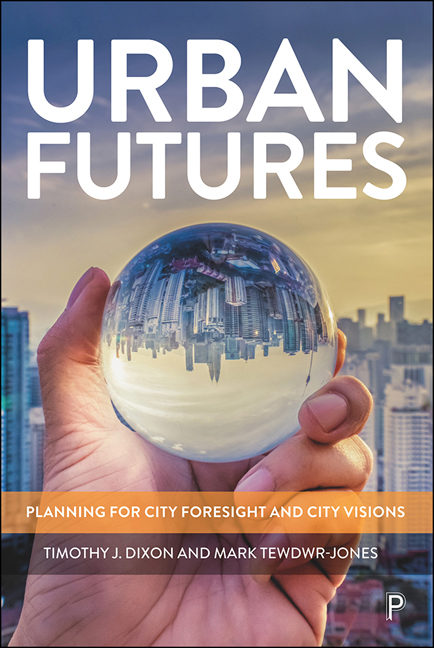Book contents
- Frontmatter
- Contents
- List of figures, tables and boxes
- Acknowledgements
- Foreword
- Preface
- 1 Urban futures: planning for city foresight and city visions
- 2 Cities and integrated urban challenges
- 3 Reimagining the city: views of the future from the past and present
- 4 Planning and governing the future city
- 5 Future narratives for the city: smart and sustainable?
- 6 Theoretical approaches to urban futures
- 7 Using city foresight methods to develop city visions
- 8 Shaping the future: city vision case studies
- 9 The innovative and experimental city
- 10 Visioning and planning the city in an urban age: a reality check
- 11 Conclusions: facing the urban future to 2050 and beyond
- Appendix: selected examples of city visions
- Notes
- References
- Index
5 - Future narratives for the city: smart and sustainable?
Published online by Cambridge University Press: 21 December 2021
- Frontmatter
- Contents
- List of figures, tables and boxes
- Acknowledgements
- Foreword
- Preface
- 1 Urban futures: planning for city foresight and city visions
- 2 Cities and integrated urban challenges
- 3 Reimagining the city: views of the future from the past and present
- 4 Planning and governing the future city
- 5 Future narratives for the city: smart and sustainable?
- 6 Theoretical approaches to urban futures
- 7 Using city foresight methods to develop city visions
- 8 Shaping the future: city vision case studies
- 9 The innovative and experimental city
- 10 Visioning and planning the city in an urban age: a reality check
- 11 Conclusions: facing the urban future to 2050 and beyond
- Appendix: selected examples of city visions
- Notes
- References
- Index
Summary
Introduction
The intense, politicised and highly divisive debate over whether the UK should leave membership of the European Union between 2016 and 2020 (so-called Brexit) highlighted the fact that those offering competing visions of the future can become locked in an intractable battle. Similarly, the devastating COVID-19 pandemic has resulted in a great deal of soul-searching about creating a vision of what sort of place people want the UK to be in the future. In the world of cities and urban studies, we have seen a similarly important, but perhaps less brutal, battle of ideas, thoughts and visions as conceptualisations of the ideal city have been promoted in literature, art, academic discourse and policy and practice throughout history. This debate and discourse also have profound effects for the way we see and experience cities in the UK and elsewhere now, and in the future.
The two main strands of thinking, or narratives, that have emerged during the late 20th and early 21st centuries, and which build on previous historic principles, debates and discourses about cities, have been focused on sustainable cities and smart cities – both of which have been underpinned and strengthened by the emergence of international networks that promote dialogue and learning about the implementation of such cities. These two ‘signifiers’ or ‘leitmotifs’ have been highlighted and promoted not only by national governments, but also by city and municipal governments seeking to compete for investment and globalised capital.
In this chapter, we will begin by discussing and analysing how cities can be typified and conceptualised in terms of their ‘ideal’ characteristics. To do this, we will examine how new theories, such as actor network theory (ANT) and ‘urban assemblage’ theory, can help inform our thinking about cities. We then discuss and critically review the emergence of sustainable cities and smart cities before looking at the concept of ‘smart and sustainable cities’, and why visions lie at the heart of urban futures. Ultimately, as we will argue, if we are to re-imagine the future of our cities and create a solid basis for exploring and developing urban futures thinking, part of that process requires the co-production of coherent, participatory city visions that recognise the innate value of a place's character, and the needs of the people who live, work and play there.
- Type
- Chapter
- Information
- Urban FuturesPlanning for City Foresight and City Visions, pp. 79 - 100Publisher: Bristol University PressPrint publication year: 2021



